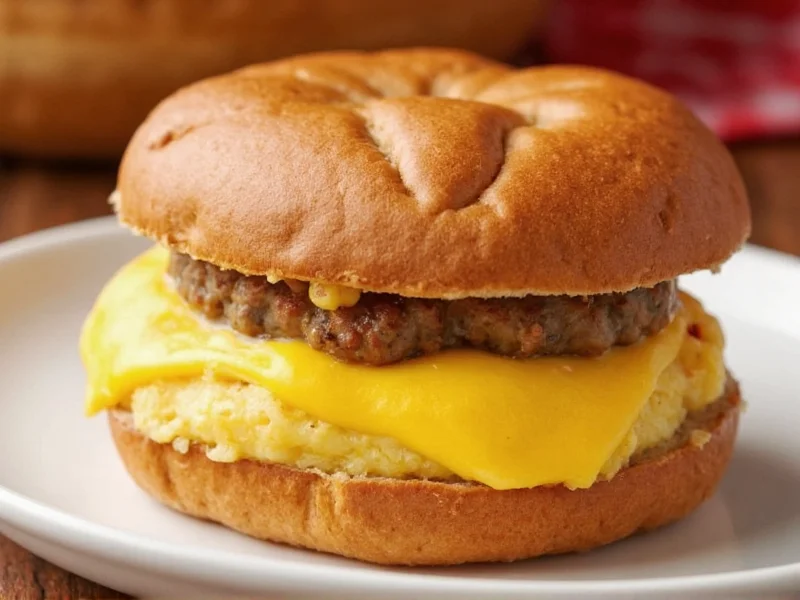Understanding the complete nutritional profile of fast food breakfast items helps make informed dietary choices. The Sausage Egg Cheese McMuffin represents a popular morning option that delivers substantial protein but also significant saturated fat and sodium content. This detailed breakdown provides accurate nutritional information based on McDonald's official data.
Complete Nutritional Analysis of Sausage Egg Cheese McMuffin
When evaluating the nutritional value of the sausage egg cheese mcmuffin calories information, it's essential to consider the full picture beyond just calorie count. McDonald's publishes detailed nutrition facts for all menu items, allowing consumers to make educated decisions about their food choices.
| Nutrient | Amount | % Daily Value* |
|---|---|---|
| Calories | 480 | |
| Total Fat | 32g | 41% |
| Saturated Fat | 15g | 75% |
| Trans Fat | 0.5g | |
| Cholesterol | 240mg | 80% |
| Sodium | 1190mg | 52% |
| Total Carbohydrates | 32g | 12% |
| Dietary Fiber | 2g | 7% |
| Sugars | 2g | |
| Protein | 22g |
Macronutrient Distribution and Dietary Context
The sausage egg cheese mcmuffin nutrition facts reveal a balanced macronutrient profile with 22g of protein, making it relatively satisfying compared to other fast food breakfast options. However, the 32g of total fat and 15g of saturated fat represent significant portions of recommended daily limits. For individuals monitoring their cardiovascular health, this information about mcdonald's sausage egg cheese mcmuffin calories becomes particularly relevant.
Nutritionists generally recommend limiting saturated fat to less than 10% of daily calories, which for a 2,000-calorie diet means staying under 22g. The Sausage Egg Cheese McMuffin alone provides nearly 70% of this limit. Similarly, the 1,190mg of sodium accounts for over half the recommended daily maximum of 2,300mg.
Ingredient Analysis and Preparation
Understanding what contributes to the sausage egg cheese mcmuffin calories requires examining its components. The sandwich contains:
- English muffin (providing carbohydrates and fiber)
- Pork sausage patty (primary source of protein and fat)
- Folded egg (additional protein source)
- American cheese slice (contributing saturated fat and sodium)
Each component adds specific nutritional elements that collectively create the final nutritional profile. The cooking process also affects the final calorie count, as ingredients may absorb additional fats during preparation.
Comparing Breakfast Menu Options
When considering how many calories in sausage egg cheese mcmuffin compared to alternatives, several options exist:
- Egg McMuffin (without cheese): 300 calories
- Sausage McMuffin: 400 calories
- Hash Browns: 140 calories
- Fruit & Maple Oatmeal: 320 calories
For those specifically tracking mcdonald's breakfast calories, understanding these differences helps make more informed choices based on individual dietary needs and goals. The Sausage Egg Cheese McMuffin sits at the higher end of the calorie spectrum among standard breakfast offerings.
Health Considerations and Dietary Planning
While the sausage egg cheese mcmuffin nutritional information shows it provides substantial protein, the high saturated fat and sodium content warrant consideration. For individuals managing hypertension, heart disease risk, or following specific dietary protocols, this information becomes crucial for meal planning.
Nutrition professionals often recommend balancing higher-calorie meals with lighter options throughout the day. When incorporating items like the Sausage Egg Cheese McMuffin into your diet, consider pairing it with lower-sodium, higher-fiber options later to maintain overall nutritional balance.
Practical Tips for Health-Conscious Consumers
For those who enjoy the taste of the Sausage Egg Cheese McMuffin but want to reduce calorie intake, several modifications can help:
- Request no cheese to save approximately 60 calories and 5g of fat
- Ask for egg whites instead of the folded egg for reduced cholesterol
- Pair with a side of fruit instead of hash browns for additional fiber
- Consider it an occasional treat rather than a daily breakfast option
These small adjustments can significantly impact the overall nutritional value while still enjoying familiar flavors. Understanding detailed sausage egg cheese mcmuffin macros helps make these informed modifications.
Frequently Asked Questions
How many calories are in a Sausage Egg Cheese McMuffin?
A standard McDonald's Sausage Egg Cheese McMuffin contains 480 calories according to the company's official nutrition information.
Is the Sausage Egg Cheese McMuffin high in protein?
Yes, the Sausage Egg Cheese McMuffin provides 22g of protein, which represents a substantial portion of the recommended daily intake for most adults.
What makes up the calorie content in a Sausage Egg Cheese McMuffin?
The calorie content primarily comes from the pork sausage patty (highest fat content), the folded egg, American cheese, and the English muffin. The sausage contributes the most fat, while the muffin provides most carbohydrates.
How does the sodium content compare to daily recommendations?
With 1,190mg of sodium, the Sausage Egg Cheese McMuffin contains approximately 52% of the recommended daily maximum of 2,300mg for healthy adults, making it relatively high in sodium.
Are there lower-calorie alternatives to the Sausage Egg Cheese McMuffin?
Yes, the standard Egg McMuffin (without cheese) contains 300 calories, and the Sausage McMuffin (without egg and cheese) has 400 calories. McDonald's also offers fruit and yogurt parfaits and oatmeal as lower-calorie breakfast alternatives.











 浙公网安备
33010002000092号
浙公网安备
33010002000092号 浙B2-20120091-4
浙B2-20120091-4